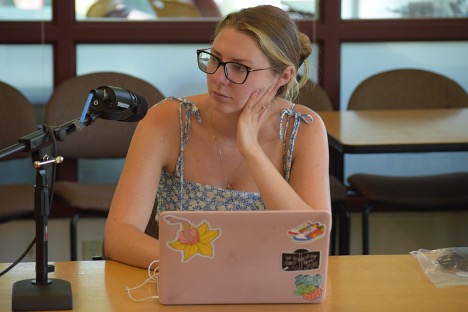By Caroline Conroy
Originally published March 11, 2022
When I first started on my research project, investigating faculty perceptions of code meshing in classrooms, myself and others at the Writing Center kept saying to ourselves something along the lines of “change does not happen in a vacuum; it is important that we involve others at DU, especially faculty, in our fight for linguistic justice.”
So, I went to faculty via a survey and asked questions related to the kinds of barriers that might be preventing them from accepting and appreciating code meshing in their classroom spaces. My results quickly informed me that it is not just faculty with whom we need to work; prospective students, current students, alumni, employers, community members, administration, and more are needed to join the movement towards linguistically just futures. The faculty who participated in my survey frequently cited the need to teach and use Standard Academic English because it is needed (1) to communicate with the wider audience outside of classrooms and (2) for their future careers.
These responses, including one that suggested I look at this person’s work, echo portions of Lisa Delpit’s culture of power. Delpit’s work observes that those who have power in our society have created a culture based on a particular set of rules, practices, and habits, and a student’s success depends on learning and using the rules, practices, and habits of this culture. To ensure that students have access to power and success, she “suggest[s] that students must be taught the codes needed to participate fully in the mainstream of American life […] that they must be allowed the resource of the teacher’s expert knowledge.”
Following Delpit’s reasoning, there clearly does seem to be a need to teach and use Standard English; otherwise, we engage in gatekeeping, withholding others from the information they could use to succeed; otherwise, we fail to provide students/writers with the necessary tools for today’s world, one that continues to prioritize whiteness; otherwise, it’s hard.
But, if I am being totally honest, I felt angry reading those responses with their reasons for why Standard Academic English is still just that — the standard. My thought partners Jasmine and Kristen, two fellow consultants here at the Writing Center, listened to my concerns, reflected, and voiced resonant sentiments. Kristen said that with this work of linguistic justice, there are two parts: teaching to the status quo and teaching towards the world we want to see.
In my survey results, I saw a lot of teaching to the status quo, and not a lot of teaching towards the future we want. Change does not happen in the vacuum of a specific space or time; it is important that we involve others at DU and beyond and look towards the future in our work for linguistic justice.

